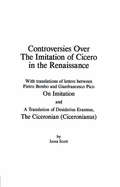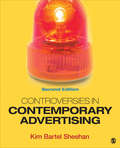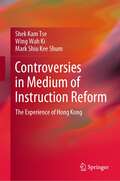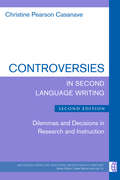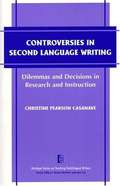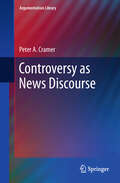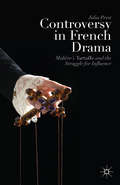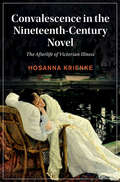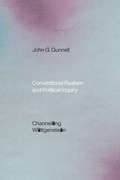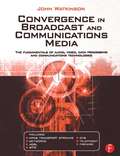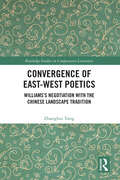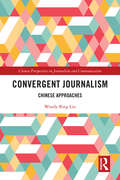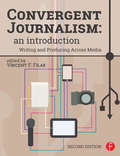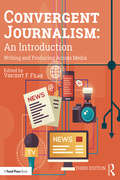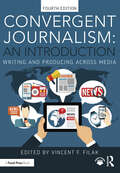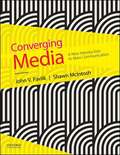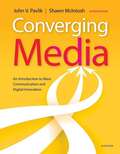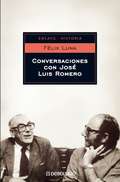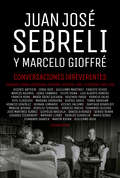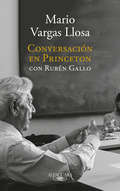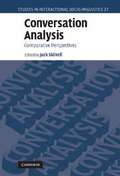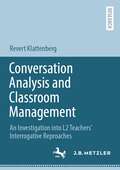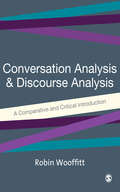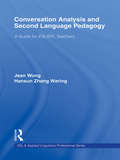- Table View
- List View
Controlling Readers
by Deborah L. McgradyGuillaume de Machaut (1300-1377) was the master poet of fourteenth-century France. He established models for much of the vernacular poetry written by subsequent generations, and he was instrumental in institutionalizing the lay reader. In particular, his longest and most important work, the Voir dit, calls attention to the coexistence of public and private reading practices through its intensely hybrid form: sixty-three poems and ten songs invite an oral performance, while forty-six private prose letters as well as elaborate illustration and references to it's own materiality promote a physical encounter with the book.In Controlling Readers, Deborah McGrady uses Machaut's corpus as a case study to explore the impact of lay literacy on the culture of late-medieval Europe. Arguing that Machaut and his bookmakers were responding to contemporary debates surrounding literacy, McGrady first accounts for the formal invention of the lay reader in medieval art and literature, then analyses Machaut and his bookmakers' innovative use of both narrative and bibliographical devices to try to control the responses of his readers and promote intimate and sensual reading practices in place of the more common public performances of court culture. McGrady's erudite and exhaustive study is key to understanding Machaut, his works, and his influence on the history of reading in the fourteenth-century and beyond.
Controversies Over the Imitation of Cicero in the Renaissance
by Izora ScottThough the term Ciceronianism could be applied to Cicero's influence and teaching in the field of politics, philosophy, or rhetoric, it is limited in the present study to the technical department of rhetoric. In addition, it represents the trend of literary opinion in regard to accepting Cicero as a model for imitation in composition. The history of Ciceronianism, thus interpreted, has been written with more or less emphasis upon the controversial aspect of the subject in various languages. This work is particularly valuable because the author presents not only her clear analysis of the issues involved, but also translations of key texts by major Renaissance humanists who were involved in the controversy. These include a set of letters between the Italians Pietro Bembo and Gianfrancesco Pico della Mirandola and, more importantly, "The Ciceronian" of the Dutch humanist Desiderius Erasmus. The issues were complex. At one end of the spectrum were the "ultra Ciceronians," mainly Italian, who believed that no Latin word or syntactical structure should be used that was not in Cicero's works. At the other end of the spectrum were those who felt that a number of authors -- Cicero included -- were worthy of emulation. It was not however a mere quibbling about literary style, since the debate came to involve charges of paganism versus Christianity, and challenged the basic concept of humanism developed first in Italy and then in France during the 15th and 16th centuries. The work falls into three divisions: * an introductory chapter on the influence of Cicero from his own time to that of Poggio and Valla when men of letters began a series of controversial writings on the merits of Cicero as a model of style, * a series of chapters treating of these controversies, and * a study of the connection between the entire movement and the history of education.
Controversies in Contemporary Advertising
by Kim B. SheehanPresenting a range of perspectives on advertising in a global society, this Second Edition of Controversies in Contemporary Advertising examines economic, political, social, and ethical perspectives and covers a number of topics including stereotyping, controversial products, consumer culture, and new technology. The book is divided equally between macro and micro issues, providing a balanced portrait of the role advertising has in society today. Author Kim Bartel Sheehan′s work recognizes the plurality of opinions towards advertising, allowing the reader to form and analyze their own judgments. It encourages readers to obtain a critical perspective on advertising issues.
Controversies in Medium of Instruction Reform: The Experience of Hong Kong
by Shek Kam Tse Wing Wah Ki Mark Shiu ShumThe book is an in-depth and comprehensive analysis of the case of language in education reform and language policy controversies of Hong Kong over the initial two decades after 1997. It is a scholarly monograph of conscientious educators and researchers who have been active during the education reform, collaborating with different parties on school development and classroom teaching experiments. This book provides a multiple-perspective investigation into the education and language matters. Besides socio-political perspectives, this book also emphasizes the frontline educational and practical perspectives. The book explores the benefits and effective methods of mother-tongue and multi-lingual teaching that have emerged in the period. Based on the problematic experience of language purism and bifurcation in the reform, the book argues for an inclusive multilingual education policy with mother-tongue as the core. This book provides potential solutions and good practices to tackle the complex issues brought about by medium of instruction policy reforms in post-colonial times.
Controversies in Second Language Writing, Second Edition: Dilemmas and Decisions in Research and Instruction
by Christine Pearson CasanaveIn the years since the first edition of Controversies in Second Language Writing was published, there been little to no clear resolution of the controversies Casanave so accessibly and fair-mindedly laid out. In fact, many of them have become far more complex and intertwined with many other 21st century issues that teachers of L2 writing cannot help but be affected by in their classrooms. Therefore, this second edition has set out to address: What issues if any have been resolved? What issues have had lasting power from the past, either because people are resistant to change or because the issues continue to be unresolved ones that writing teachers and scholars need to keep discussing? The second edition is a thorough revision with all chapters updated to refer to works written since the first edition was published. A few chapters have been added: one devoted to writing in a digital era (Chapter 3); one devoted to the debates about English as a lingua franca, "translingual literacy practices," and other hybrid uses of English that have been ongoing in the last ten years (Chapter 4); and one giving special attention to issues related to writing from sources and plagiarism (Chapter 6). As with the first edition, the second edition of Controversies is not a book that will teach readers how to do things. Rather, it is a book designed to help readers think and to wrestle with issues in L2 writing that are not easily resolved by how-to prescriptions.
Controversies in Second Language Writing: Dilemmas and Decisions in Research and Instruction
by Christine Pearson CasanaveControversies in Second Language Writing is not a how-to book, but one that focuses on how teachers in L2 writing can be helped to make reasoned decisions by understanding some of the key issues and conflicting opinions about L2 writing research and pedagogy. This book will assist teachers in making informed decisions about teaching writing in the ESL classroom. To counteract some of the debates, Casanave explores the different sides of the arguments and provides examples of how other teachers have dealt with these issues. The book presents novice and seasoned teachers with thought-provoking issues and questions to consider when determining and reflecting on their own teaching strategies and criteria. Topics discussed include: contrastive rhetoric product vs. process fluency and accuracy assessment of student work audience plagiarism politics and ideology.
Controversy as News Discourse (Argumentation Library #19)
by Peter A. CramerThis book presents a constitutive approach to controversy based on a discourse analysis of news texts, focusing on the role of journalists as participants who shape public controversy for readers. Drawing data from the Reuters Corpus, the project identifies formulas that journalists use in reporting controversy and draws conclusions about how these serve professional and textual functions and how they shape public controversy as a natural, historical, and pragmatic event. While the traditions of dialectic and rhetoric have focused on the prescriptive aim of training participants to resolve controversies in philosophical dialogue or public debate settings, this orientation has tended to preempt questions about where controversy is located and how it is shaped. This project contributes to descriptive, ethnographic research about controversy, using discourse analysis to address a problem in argumentation.
Controversy in French Drama: Molière’s Tartuffe and the Struggle for Influence
by Julia PrestIn 1664, Molière's Tartuffe was banned from public performance. This book provides a detailed, in-depth account of five-year struggle (1664-69) to have the ban lifted and, so doing, sheds important new light on 1660s France and the ancien régime more broadly.
Convalescence in the Nineteenth-Century Novel: The Afterlife of Victorian Illness (Cambridge Studies in Nineteenth-Century Literature and Culture #129)
by Hosanna KrienkeVictorian Britain witnessed a resurgence of traditional convalescent caregiving. In the face of a hectic modern existence, nineteenth-century thinkers argued that all medical patients desperately required a lengthy, meandering period of recovery. Various reformers worked to extend the benefits of holistic recuperative care to seemingly unlikely groups: working-class hospital patients, insane asylum inmates, even low-ranking soldiers across the British Empire. Hosanna Krienke offers the first sustained scholarly assessment of nineteenth-century convalescent culture, revealing how interpersonal post-acute care was touted as a critical supplement to modern scientific medicine. As a method of caregiving intended to alleviate both physical and social ills, convalescence united patients of disparate social classes, disease categories, and degrees of impairment. Ultimately, this study demonstrates how novels from Bleak House to The Secret Garden draw on the unhurried timescale of convalescence as an ethical paradigm, training readers to value unfolding narratives apart from their ultimate resolutions.
Conventional Realism and Political Inquiry: Channeling Wittgenstein
by John G. GunnellWhen social scientists and social theorists turn to the work of philosophers for intellectual and practical authority, they typically assume that truth, reality, and meaning are to be found outside rather than within our conventional discursive practices. John G. Gunnell argues for conventional realism as a theory of social phenomena and an approach to the study of politics. Drawing on Wittgenstein’s critique of “mentalism” and traditional realism, Gunnell argues that everything we designate as “real” is rendered conventionally, which entails a rejection of the widely accepted distinction between what is natural and what is conventional. The terms “reality” and “world” have no meaning outside the contexts of specific claims and assumptions about what exists and how it behaves. And rather than a mysterious source and repository of prelinguistic meaning, the “mind” is simply our linguistic capacities. Taking readers through contemporary forms of mentalism and realism in both philosophy and American political science and theory, Gunnell also analyzes the philosophical challenges to these positions mounted by Wittgenstein and those who can be construed as his successors.
Convergence in Broadcast and Communications Media
by John WatkinsonConvergence in Broadcast and Communications Media offers concise and accurate information for engineers and technicians tackling products and systems combining audio, video, data processing and communications. Without adequate fundamental knowledge of the core technologies, products could be flawed or even fail. John Watkinson has provided a definitive professional guide, designed as a standard point of reference for engineers, whether you are from an audio, video, computer or communications background. Without assuming any background and starting from first principles, the four core technologies of image reproduction, sound reproduction, data processing and communications are described. Covering everything from digital fundamentals to conversion methods, sound and image technologies, compression techniques, digital coding principles, storage devices and the latest communications systems, the book shows how these technologies operate together and the necessary conversions that take place between them. Acronyms and buzzwords are introduced only after their purpose has been described in plain English - as the book serves to give a reliable grasp of the fundamentals. The criteria involved in determining image and sound quality are based on a thorough treatment of the human senses, a unique description of how motion portrayal works in managing systems.John Watkinson is an international consultant in audio video and data recording. He is a Fellow of the AES, a member of the British Computer Society and a chartered information systems practitioner. He presents lectures, seminars, conference papers and training courses worldwide and writes for many industry magazines. His other books for Focal Press are widely acknowledged as standard reference works and industry `bibles'. John is author of MPEG2, The Art of Digital Video and the Art of Digital Audio, An Introduction to Digital Video, An Introduction to Digital Audio, The Art of Sound Reproduction, Television Fundamentals, Co-author of The Digital Interface Handbook and Contributor to The Loudspeaker and Headphone Handbook.
Convergence of East-West Poetics: Williams’s Negotiation with the Chinese Landscape Tradition (Routledge Studies in Comparative Literature)
by Zhanghui YangThe present book examines William Carlos Williams’s negotiation with cultural modes and systems of the Chinese landscape tradition in his landscape writing. Focusing on Walliams’s landscape modes of landscape with(out) infused emotions, the book builds a linkage between their interactions with Chinese landscape aesthetics and shows how these conversations helped shape Williams’s cross-cultural landscape poetics. The exploration of Williams’s experiment with the Chinese serene interplay of self and landscape, the interfusion of scene and emotion, an idea of seeing from the perspective of Wang Guowei’s theory of jingjie, and the poetic space of frustration and completion in the context of space and human geography, expand the understanding of a cross-cultural landscape tradition developed by Williams through bringing into focus the convergence of East-West poetics.
Convergent Journalism: Chinese Approaches (Chinese Perspectives on Journalism and Communication)
by Woody Bing LiuConvergent Journalism is an online news system that uses a range of media and methods to collect and present information. With the advent and growth of the Internet, this form of news has been flourishing globally and has become the mainstream in China. In 2014, the Chinese Government established media convergence as a national strategy. This book offers a panoramic view of the theories and practice of Convergent Journalism in a Chinese media landscape. Drawing on a plethora of cases, the author introduces concepts, subjects, and processes, and elaborates on media components including text, visuals, audio, and video. In addition, he discusses the application of search engine optimization, hyperlinks in reporting, user interaction, and user creation of content. Aside from providing an in-depth theoretical analysis, the book provides much guidance for practitioners. Students, scholars, and professionals of communication studies, journalism, and media studies will benefit from this book.
Convergent Journalism: Writing and Producing Across Media
by Vincent F. FilakConvergent Journalism: An Introduction is a pioneering textbook that will teach you how to master the skills needed to be a journalist in today's converged media landscape. This book shows you what makes a news story effective, and how to identify the best platform for a particular story, whether it's the Web, broadcast or print. The bedrock tenets of journalism remain at the core of this book, including information dissemination, storytelling, audience engagement. After establishing these journalism basics, the book goes into great detail on how to tailor a story to meet the needs of various media. Vincent F. Filak has brought this second edition completely up to date through: A thorough reorganization of the chapters, which provides a newer, more practical approach focused on "how to do convergent journalism," rather than simply observing the current state of converged media. A number of new pedagogical features to improve learning and retention, including examples, exercises, breakout boxes and more. Coverage of additional topics such as issues of law and ethics in digital media, and also writing for mobile platforms and social media. A companion website with links to additional examples of quality text, images and multimedia for students, as well as an instructor site with a test bank, suggested exercises and discussion questions.
Convergent Journalism: Writing and Producing Across Media
by Vincent F. FilakConvergent Journalism: An Introduction is the pioneering textbook on practicing journalism in the 21st century, now in its third edition, offering chapters by industry experts covering key components for today’s convergenced media landscape. <p><p> Each chapter of this book is written by an expert in the field, offering practical and key skills for the different aspects that make up the practice of journalism today. This new edition, written from the ground up, shifts the discussion toward a model of responsible and audience-centric journalism and demonstrates the ways journalists can use new media tools as both senders and receivers. The bedrock tenets of journalism remain at the core of this book, including information dissemination, storytelling, and audience engagement. This book offers readers: <p> • A number of pedagogical features to improve learning and retention, including examples, exercises, breakout boxes and more <p> • Coverage of additional topics such as issues of law and ethics in digital media, and also writing for mobile platforms and social media <p> • Individual chapters written by subject experts, giving readers the necessary know-how for converged media by proven leaders in the field <p> Students looking for the practical skills and ethical background necessary for producing journalism in the contemporary media landscape will find this book an invaluable resource. It is perfect for students in courses such as Convergent Journalism, Digital Media, Online Journalism, and Multimedia Journalism.
Convergent Journalism: Writing and Producing Across Media
by Vincent F. FilakBringing together industry experts from across platforms and journalism specialisms, Convergent Journalism: An Introduction is the pioneering textbook on practicing journalism in today’s multimedia landscape. Convergent Journalism combines practical skills with a solid ethical framework. Each chapter is written by an expert in the field and features lively examples, exercises and breakout boxes to aid learning and retention. Written from the perspective of a responsible and audience-centric form of journalism and demonstrating ways journalists can use new media tools as both senders and receivers, this fourth edition features: • Completely revised chapters on social media, digital journalism, and law; • Additional discussion questions and exercises in every chapter; • Updated examples throughout. This book is an invaluable resource for students enrolled in courses such as Convergent Journalism, Digital Media, Online Journalism, and Multimedia Journalism.
Converging Media
by John V. Pavlik Shawn McIntoshIndustry. Culture. Technology. It's time they came together. From reading news on tablets to video calling on smartphones, digital media has changed the ways in which we communicate. Placing convergence at the center of the discussion, Converging Media: A New Introduction to Mass Communication, Sixth Edition, uses the technologies we employ every day to explain our current media environment--and to consider where we might be headed.
Converging Media: An Introduction To Mass Communication And Digital Innovation
by Shawn McIntosh John PavlikIndustry. Culture. Technology. They have come together. What's next? From reading news on tablets to video calling on smartphones, digital media has changed the ways in which we communicate. Placing convergence at the center of the discussion, Converging Media: An Introduction to Mass Communication, Seventh Edition, uses the technologies we employ every day to explain our current media environment-and to consider where we might be headed.
Conversaciones con José Luis Romero
by Felix LunaUn libro imperdible para conocer la historia argentina. Félix Lunaentrevista al historiador más importante que dio el país y uno de losmás grandes de Latinoamérica. José Luis Romero (1909-1977) fue uno de los más grandes historiadoreslatinoamericanos y, por su modalidad intelectual, trascendió lacondición habitual del historiador especializado. Fue el tipo, por demásinfrecuente, del historiador humanista. Si algo lo caracterizó, sinpérdida alguna del rigor técnico, fue su amplitud: el dilatado alcancede sus proyectos de investigación y la variedad de épocas, campos ysubdisciplinas históricas que cultivó. Sin descartar lo temperamental deesa inclinación, pudo influir en ella el clima de su formación: eltemprano aprovechamiento del magisterio de Pedro Henríquez Ureña, lacercanía a Alejandro Korn y su grupo en la ciudad de La Plata y laestrecha relación con su hermano Francisco, el filósofo que fue suprimer guía, factores todos que además de inducir a una ética delesfuerzo y a la profunda seriedad en el trabajo intelectual, tenían eltoque de lo filosófico, con su tendencia a la mirada en profundidad y enamplitud.
Conversaciones irreverentes: Diálogos sobre literatura, historia, política, cine, filosofía y arte
by Juan José Sebreli Marcelo GioffréTreinta y cinco entrevistas realizadas por Juan José Sebreli y Marcelo Gioffré a personalidades destacadas de los campos cultural, político e intelectual argentinos. Conversaciones irreverentes reúne treinta y cinco entrevistas realizadas por Juan José Sebreli y Marcelo Gioffré a personalidades destacadas de los campos cultural, político e intelectual argentinos. Según su temática principal, se encuentran agrupadas en seis partes (Literatura, Historia, Política, Cine argentino, Filosofía y Arte) que estructuran este libro. Si bien no todas las entrevistas tienen a la política como eje principal de la conversación, ésta aparece inevitablemente a cada paso: el apogeo kirchnerista -vivido por los autores "como una oscura noche, un largo invierno, una pesadilla"- es el telón de fondo en el que despunta la luz del diálogo inteligente, la conversación profunda, el intercambio estimulante y, siempre, la reflexión aguda.
Conversación en Princeton con Rubén Gallo
by Mario Vargas Llosa Ruben GalloUna clase magistral sobre la actualidad y el oficio de novelista por el Premio Nobel de Literatura Mario Vargas Llosa. Universidad de Princeton, Nueva Jersey, 2015. Durante un semestre, Mario Vargas Llosa impartió junto a Rubén Gallo un curso sobre literatura y política. Ambos conversaron con los alumnos sobre teoría de la novela, y sobre la relación del periodismo y la política con la literatura, a través de cinco obras del autor: Conversación en La Catedral, Historia de Mayta, ¿Quién mató a Palomino Molero?, El pez en el agua y La Fiesta del Chivo. En estas conversaciones, el Nobel, con su brillantez acostumbrada, habla del oficio de escritor y de los retos a los que se enfrenta en la construcción de sus novelas, pero también ofrece un análisis inteligente de la actualidad. Es especialmente conmovedora la charla con Philippe Lançon, periodista del Charlie Hebdo que sobrevivió al atentado islamista perpetrado ese mismo año. Tres perspectivas complementarias confluyen en este libro: la del autor, que desvela el proceso creativo de sus novelas; la de Rubén Gallo, que analiza las distintas significaciones que las obras de Vargas Llosa cobran en el momento de su difusión, y la de los alumnos, que con sus reflexiones y preguntas dan voz a los millones de lectores de Vargas Llosa. Conversación en Princeton es una oportunidad sin igual para asistir a un curso magistral sobre literatura y realidad impartido por uno de los escritores más reconocidos y valorados en todo el mundo.
Conversation Analysis
by Jack SidnellCombining the main findings, methods and analytic techniques of this central approach to language and social interaction, along with real-life examples and step-by-step explanations, Conversation Analysis is the ideal student guide to the field. * Introduces the main findings, methods and analytic techniques of conversation analysis (CA) - a growing interdisciplinary field exploring language and social interaction * Provides an engaging historical overview of the field, along with detailed coverage of the key findings in each area of CA and a guide to current research * Examines the way talk is composed, and how conversation structures highlight aspects of human behavior * Focuses on the most important domains of organization in conversation, including turn-taking, action sequencing, repair, stories, openings and closings, and the effect of context * Includes real-life examples and step-by-step explanations, making it an ideal guide for students navigating this growing field
Conversation Analysis and Classroom Management: An Investigation into L2 Teachers’ Interrogative Reproaches
by Revert KlattenbergStrategies for successful classroom management have been readily available to practitioners for at least half a century. However, despite the vast body of knowledge available, there appears to be a great deal of scope for further research in terms of developing a more detailed understanding of the interactional details of classroom management practices. Drawing on a corpus of 58 hours of video and audio recordings in English as a Foreign Language classrooms in Germany, the book provides a micro-analytical perspective of foreign language classroom management. It contributes to the body of current research by focusing on how foreign language teachers respond to pupils’ classroom norm violations using interrogative constructions (i.e. interrogative reproaches). Through a Conversation Analytic investigation of these social actions, the paper provides valuable insights into the details of the in-situ production of classroom management strategies and their underlying interactional mechanisms.
Conversation Analysis and Discourse Analysis: A Comparative and Critical Introduction
by Dr Robin Wooffitt`This is one of those books that, researchers, students and teachers want to have on their desks, because it answers questions, clarifies confusing areas, and provides accessible overviews of sometimes technical work - and all in prose that is unpretentious and engaging' - British Journal of Sociology `There is no doubt that conversation analysis (CA) is an impressive and valuable approach to studying discourse, and Wooffitt does an excellent job of demonstrating its analytical sophistication and rigour' - European Journal of Communication `This is an excellent book: clear, engaging and authoritative. It treads a path through the many confusions and provides a map of the fields of conversation analysis, discourse analysis, critical discourse analysis and discursive psychology which is better than any currently available. It will be a valuable resource in teaching' - Professor Jonathan Potter, Loughborough University `An excellent exposition: concepts are explained and put into context, and the reader is guided from introductory to advanced levls of discussion. Wooffitt sets out and answers the kinds of questions typically raised by students and others about relations and differences between discourse and conversation analysis... engaging and useful' - Professor Derek Edwards, Loughborough University This significant text by Robin Wooffitt is the first to systematically examine the complex relationship between conversation analysis and discourse analysis. It comes at a timely moment: despite the close connection between the two forms of analyses in academic research, no other existing text explains these links methodically, comprehensively and for the benefit of undergraduate and master's students. Key features of this text: - It takes students from first principles up to more advanced debates, and is therefore suitable for under grad and MA/PhD students. - Careful illustration of methodological approaches through detailed analysis of data. - Clarity of writing; lengthy chapter summaries; further readings; glossary of CA/DA terminology as an appendix. Conversation Analysis and Discourse Analysis shows how the methods and findings of conversation and discourse analysis may inform the development of empirical research questions. It will therefore be an invaluable resource for social science students on courses which require them to undertake practical or empirical exercises.
Conversation Analysis and Second Language Pedagogy: A Guide for ESL/ EFL Teachers (ESL & Applied Linguistics Professional Series)
by Hansun Zhang Waring Jean WongConversation and speaking skills are the key building blocks for much of language learning. This text increases teachers’ awareness about spoken language and suggests ways of applying that knowledge to teaching second-language interaction skills based on insights from Conversation Analysis (CA). Conversation Analysis and Second Language Pedagogy: reviews key CA concepts and findings directly connects findings from CA with second language pedagogy presents a model of interactional practices grounded in CA concepts includes numerous transcripts of actual talk invites readers to complete a variety of tasks to solidify and extend their understandings features a useful collection of practical teaching activities. The time is ripe for a book that blends conversation analysis and applied linguistics. This text takes that important step, extending the reaches of these once separate academic fields. Assuming neither background knowledge of conversation analysis nor its connection to second language teaching, it is designed for courses in TESOL and applied linguistics and as a resource for experienced teachers, material developers, and language assessment specialists seeking to update their knowledge and hone their craft.

